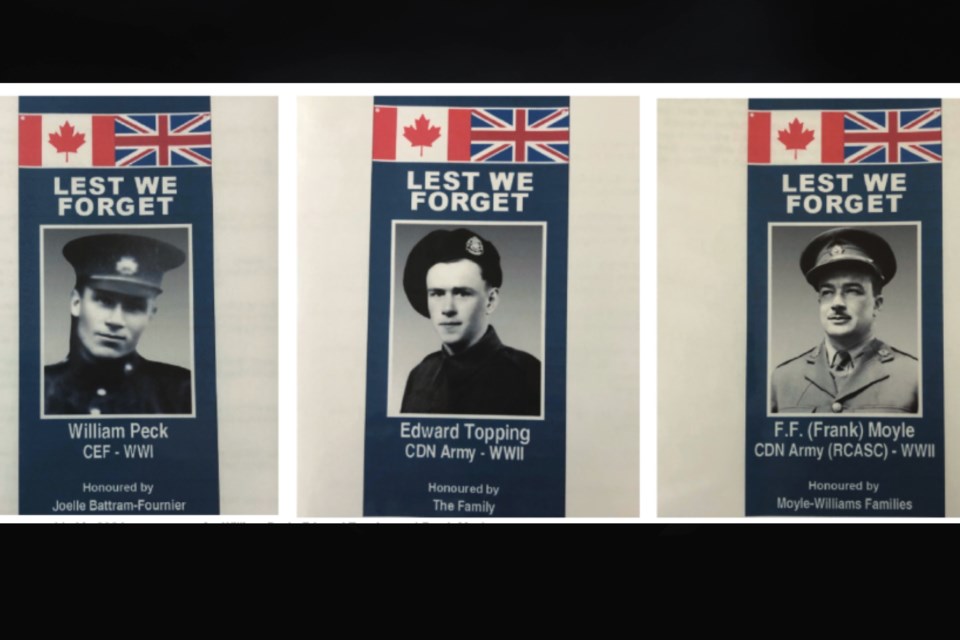DIDSBURY - The Didsbury Veterans Banner Project 2024 version recognizes and honours three local veterans, one who died in the First World War and two who saw service during the Second World War.
Started in 2019, the banner project involves the displaying of large, street lamp-mounted banners around Didsbury that feature veteran portraits along with some of their respective service history.
The project is co-sponsored by the Didsbury Museum, the Royal Canadian Legion and the Town of Didsbury.
Each year, the families and descendants of the veterans purchase the banners, which are displayed on the light standards from early October through to near the end of November.
Each banner is topped with Canadian and British flags as well as the words Lest We Forget and biographies of the veterans are submitted by their families. The three banners added this year include:
William Peck
William Peck was born in Yorkshire, England in 1883, later moving to the Didsbury area and being granted a homestead north of town.
With the profession of a farmer, William signed his attestation papers on Aug. 31, 1916 at Sarcee Camp, giving his father’s name as next of kin.
Shipped to Europe as a member of the Canadian Expeditionary Force, Peck served in the Canadian Infantry (Alberta Regiment) 31st Battalion.
He died of wounds received at the battle of Passchendaele in 1917.
“Although many who fought at Passchendaele were not honoured with a proper burial because the incessant fighting made it impossible to collect the fallen, Peck, who died on Nov. 6, 1917 at the age of 36 was buried at Tyne Cot British Cemetery in Belgium,” the biography reads.
Peck is commemorated on page 307 of the First World War Book of Remembrance in Ottawa.
Edward Topping
Born in Jenner, Alberta in 1917, Topping completed Grade 10 and worked on a threshing crew on Alberta farms.
In 1941, Topping volunteered for the army, signing up with Calgary’s 14th Canadian Army Tank Regiment. He received training in Calgary and then at Camp Bowden in Ontario.
In July 1941, he was sent overseas to England and the following summer as a tank loader/operating, his squadron participated in the Dieppe raid. He survived the battle and made it back to England.
In 1943 he was assigned to the Italian front.
“Here his tank was shot, injuring his knee and thigh with shrapnel. He was sent to a hospital in Sorrento, Italy for a lengthy recovery. Later postings with his new Squadron C took him up the coast to France and Holland,” the biography reads.
On Aug. 26, 1945, Topping married war bride Joyce Peacock. The couple farmed in the Westcott and Sundre area before moving to Didsbury in 1978. Topping passed away in December 2003.
Frank Moyle
Born in Brantford, Ontario in 1911, Moyle was raised in Didsbury.
Before the Second World War, Moyle joined the 15th Canadian Light Horse Cavalry in Calgary, a decision influenced by his father Fred’s service in the First World War.
When the war broke out Moyle was told that his regiment was not being mobilized, so he requested enlistment and was taken on strength as a commissioned officer with the Royal Canadian Army Service Corp with the rank of 2nd Lieutenant on Oct. 21, 1942. He was promoted to full lieutenant two months later.
He received training in D&M, chemical warfare and certification as a war production job instructor. He also received further training in weapons and trained other officers in the art of winter warfare.
“Frank's northern exploration, expediting and development experiences were highly valued. These prepared him to provide training to men on packing motorcycles, canoes, backpacks and winter travel,” the biography states.
Although he didn’t serve overseas, despite making requests to do so, Moyle trained many incoming overseas serve men at Camp Bowden.
Following the war, he lived in the Northwest Territories working in northern development and transportation. He passed away in 1985.



